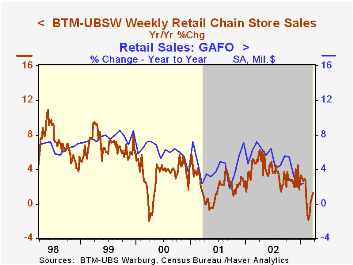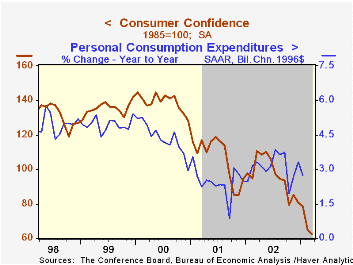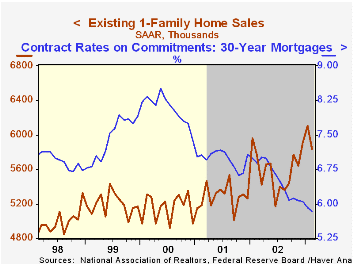 Global| Mar 25 2003
Global| Mar 25 2003Chain Store Sales Held Firm
by:Tom Moeller
|in:Economy in Brief
Summary
Chain store sales ticked 0.1% higher last week for the fourth consecutive weekly gain according to the BTM-UBSW survey. Mild weather helped sales offset the "CNN effect" related to the start of War in Iraq. The sales rise last week [...]

Chain store sales ticked 0.1% higher last week for the fourth consecutive weekly gain according to the BTM-UBSW survey. Mild weather helped sales offset the "CNN effect" related to the start of War in Iraq.
The sales rise last week lifted the month of March so far 0.6% ahead of the February average.
During the last five years there has been a 62% correlation between the year-to-year percent change in these monthly chain store sales and the change in retail sales of general merchandise, apparel and furniture (GAF, 26% of total retail sales). That correlation is comparable to the 69% correlation between Same Store sales as published by Redbook Instinet Research and GAF sales.
| BTM-UBSW (SA, 1977=100) | 3/22/03 | 3/15/03 | Y/Y | 2002 | 2001 | 2000 |
|---|---|---|---|---|---|---|
| Total Weekly Retail Chain Store Sales | 410.3 | 410.0 | 1.3% | 3.6% | 2.1% | 3.4% |
by Tom Moeller March 25, 2003

The Conference Board’s Index of Consumer Confidence fell further in March than Consensus expectations for a decline to 63.0. February confidence was revised up slightly
The 3.5% m/m decline in Consumer Confidence continued a slide that began in mid-2000. Confidence was less than half the peak level and was the lowest since October 1993. The decline in Confidence was slightly shallower than the decline in the mid-month Consumer Sentiment reading from the University of Michigan.
The decline in confidence reflected lower readings of consumer expectations and of the present situation.
Jobs were viewed as hard to get by 32.3% of respondents, the highest level since May 1994.
During the last five years there has been a 73% correlation between Consumer Confidence and the y/y change in real consumer spending.
The Conference Board's survey is conducted by a mailed questionnaire to 5,000 households and about 3,500 typically respond.
| Conference Board | Mar | Feb | Y/Y | 2002 | 2001 | 2000 |
|---|---|---|---|---|---|---|
| Consumer Confidence | 62.5 | 64.8 | -43.5% | 96.6 | 106.6 | 139.0 |
by Tom Moeller March 25, 2003

Sales of existing single family homes fell about as expected last month. The 4.3% m/m decline at least partially reflected severe Winter storms. Sales in January were revised up slightly.
Home sales fell in February in each of the country's regions except the Midwest. Home sales in the Northeast fell 2.9% (-5.6% y/y). In the South sales fell 8.0% (2.7% y/y) and in the West sales fell 6.0% (0.6% y/y). Sales rose 4.8% in the Midwest (3.2% y/y).
The median price of an existing home rose a slight 0.9% (m/m) in February to $161,600 (+8.2% y/y) .
The figures reflect closings of past home sales.
The average rate on a conventional 30-year mortgage fell last month to 5.84%.
| Existing Home Sales (000, AR) | Feb | Jan | Y/Y | 2002 | 2001 | 2000 |
|---|---|---|---|---|---|---|
| Existing Single-Family | 5,840 | 6,100 | 1.2% | 5,598 | 5,282 | 5,158 |
Tom Moeller
AuthorMore in Author Profile »Prior to joining Haver Analytics in 2000, Mr. Moeller worked as the Economist at Chancellor Capital Management from 1985 to 1999. There, he developed comprehensive economic forecasts and interpreted economic data for equity and fixed income portfolio managers. Also at Chancellor, Mr. Moeller worked as an equity analyst and was responsible for researching and rating companies in the economically sensitive automobile and housing industries for investment in Chancellor’s equity portfolio. Prior to joining Chancellor, Mr. Moeller was an Economist at Citibank from 1979 to 1984. He also analyzed pricing behavior in the metals industry for the Council on Wage and Price Stability in Washington, D.C. In 1999, Mr. Moeller received the award for most accurate forecast from the Forecasters' Club of New York. From 1990 to 1992 he was President of the New York Association for Business Economists. Mr. Moeller earned an M.B.A. in Finance from Fordham University, where he graduated in 1987. He holds a Bachelor of Arts in Economics from George Washington University.
More Economy in Brief
 Global| Feb 05 2026
Global| Feb 05 2026Charts of the Week: Balanced Policy, Resilient Data and AI Narratives
by:Andrew Cates






